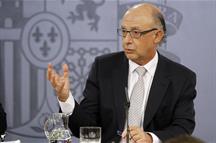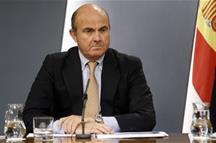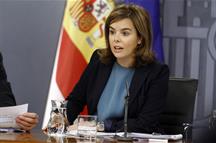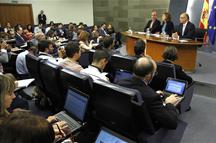Council of Ministers
Government approves 2015 Budget and revises growth and employment forecasts upwardly
Council of Ministers - 2014.9.26
Moncloa Palace, Madrid
The Vice-President of the Government, Soraya Sáenz de Santamaría, announced that the Draft General State Budget for 2015 sets "the lines for the development of the Spanish economy at a time when we have overcome the recession and are laying the foundations for recovery and to consolidate growth".
In her opinion, this budget, the fourth presented by this government, is the budget of "consolidation, recovery and job creation", and "is in line with the policy carried out by the government since it came to power". The Vice-President of the Government asserted that we have gone from being a problem to being "the country enjoying the highest growth in the Eurozone and we stand as an example at many international forums", thanks to the reforms carried out.
Soraya Sáenz de Santamaría explained that the accounts approved emphasise issues such as the public administration, which "is a sector that has borne a good part of the brunt of the adjustments, which should be acknowledged" to maintain quality services. Under the heading on investment she added that, "the priority broad strokes and actions have been set out to modernise the productive fabric, training and speed growth and job creation".
The Vice-President of the Government also announced that the budget includes investments for the Plan to Drive Growth, Competitiveness and Efficiency (Spanish acronym: CRECE), which lays special emphasis on youth unemployment, driving investment in business R&D+i, the flow of credit to SMEs, and environmental measures, particularly energy savings and water treatment.
Growth and employment budget
 Pool MoncloaThe Minister for the Treasury and Public Administration Services, Cristóbal Montoro, highlighted that this budget is marked by the tax reform and reduction in taxes. In his opinion, these public accounts focus on control, rigour and Spain's commitment to reducing the public deficit, which, together with the reforms, are helping us exit the crisis and driving job creation.
Pool MoncloaThe Minister for the Treasury and Public Administration Services, Cristóbal Montoro, highlighted that this budget is marked by the tax reform and reduction in taxes. In his opinion, these public accounts focus on control, rigour and Spain's commitment to reducing the public deficit, which, together with the reforms, are helping us exit the crisis and driving job creation.
The minister specified that the deficit of the public administration services as a whole will stand at 5.5% of GDP this year, and will close 2015 at 4.2%. As from then, the target is to return to budget stability as soon as possible. Of this 4.2%, 2.9% corresponds to central government, 0.7% to the regional governments and 0.6% to the social security system. The local authorities must reduce their deficit to zero.
Total non-financial revenue for 2015, following the allocation made to the regional governments will amount to 133.71 billion euros, an increase of 4.3% on the 2014 Budget.
Cristóbal Montoro pointed out that tax revenue will be less than the forecast by some 3 billion euros, of which 2 billion are as a result of the rebate of the 'healthcare cent'.
Under the heading of expenses, the minister confirmed that the budget provides for the pay out to civil servants of one quarter of the 2012 Christmas bonus. The replacement rate for civil servants will remain at zero, on a general basis, but this rate will rise from 10% to 50% for essential services (healthcare, education, security forces, fire-fighters and the fight against fraud).
Cristóbal Montoro stressed that the budget does not provide for an increase in the tax burden; "what is provided for is an increase in revenue from expanding tax bases" as a result of the recovery in consumption tied to the improved economic situation.
Pensions and the inter-professional minimum wage will not be frozen, said the minister; on the contrary, their purchasing power will be favoured by a situation of zero inflation such as at present and by the personal income tax reduction.
New macro-economic chart
 Pool MoncloaThe government approved the macro-economic chart for 2014-2015, which contains an upward revision of the forecasts for the two years. Growth of 1.3% is forecast for 2014, one tenth higher than the forecast in April, and 2% for 2015, two tenths higher.
Pool MoncloaThe government approved the macro-economic chart for 2014-2015, which contains an upward revision of the forecasts for the two years. Growth of 1.3% is forecast for 2014, one tenth higher than the forecast in April, and 2% for 2015, two tenths higher.
The Minister for Economic Affairs and Competition, Luis de Guindos, clarified that the macro-economic chart foresees a slowdown in the global and European economy, includes lower interest rates, the depreciation of the Euro against the US Dollar and lower prices of raw materials. Against this backdrop, Luis de Guindos highlighted that "Spain is starting to grow differentially in comparison with the Eurozone for the second consecutive year".
The minister attributed this improvement to the strength of domestic demand and to the increased flow of credit. Hence, household consumption will grow by 2% in 2014 and by 2.1% next year. Furthermore, in 2015 the construction industry will contribute positively to economic growth, for the first time.
As regards external demand, Luis de Guindos pointed out that the contribution is slightly negative this year but will post positive figures in 2015. The current account balance will record a surplus of 0.9% in 2014 and of 1.1% in 2015, and the financing capacity with the rest of the world will stand at around 1.5% of the Gross Domestic Product (GDP). "What this basically means is that we are repaying foreign debt at around some 15 billion euros in each of these two financial years", he said.
As regards inflation, the minister commented that it will remain moderate. "These have been two years of positive, balanced growth, with inflation close to zero, with a foreign trade surplus and hence a reduction in private debt and external debt. These are two years in which we are not only speeding up economic growth but also correcting the imbalances in our economy", he argued.
Employment
The macro-economic chart contains an improved job growth forecast. In national accounting terms, the unemployment rate fell from 26.1% in 2013 to 22.9% in 2015", a lower rate than at the end of the last legislature. "If we look at this legislature as a whole, unemployment will fall by more than 200,000 people in these four years and the unemployment rate will also stand at four tenths of a decimal point lower than when we came to office in the fourth quarter of 2011", underlined the minister.
Luis de Guindos pointed out that, in EPA terms (Active Population Survey), between the end of 2012 and the end of 2015, "a little more than 620,000 jobs" are expected to be created, compared with the 580,000 forecast in the Stability Programme. Unemployment will be reduced in this period by some 860,000 people.
Lending operation charged to the FLA
 Pool MoncloaThe government authorised the increase in the maximum repayment term from 10 to 11 years of the loan operations signed in 2012 with the regional governments charged to the Regional Liquidity Fund (Spanish acronym: FLA).
Pool MoncloaThe government authorised the increase in the maximum repayment term from 10 to 11 years of the loan operations signed in 2012 with the regional governments charged to the Regional Liquidity Fund (Spanish acronym: FLA).
The Vice-President of the Government said that the agreement will take place once the regional governments have shown that "they have met the general conditions set out".
Current affairs
 Pool MoncloaIn response to questions from journalists, the Vice-President of the Government, Soraya Sáenz de Santamaría, recalled that, since the President of the Regional Government of Catalonia, Artur Mas, proposed holding a referendum on sovereignty, the government "made it patently clear that this had no place in our rules on democracy", and hence "what we said then must now be implemented".
Pool MoncloaIn response to questions from journalists, the Vice-President of the Government, Soraya Sáenz de Santamaría, recalled that, since the President of the Regional Government of Catalonia, Artur Mas, proposed holding a referendum on sovereignty, the government "made it patently clear that this had no place in our rules on democracy", and hence "what we said then must now be implemented".
Consequently, she explained that once the Catalan Act on a referendum is published and the decree calling a referendum is signed, the government will request a report from the Council of State; once this opinion is issued, the Council of Ministers will meet - presumably on Monday, 29 October - and "that same morning" an appeal will be lodged on the unconstitutional nature of the Act. If the government asks for the law to be overturned "and it will ask for it", no "lawful referendum may be organised because that is what the Constitution states".





